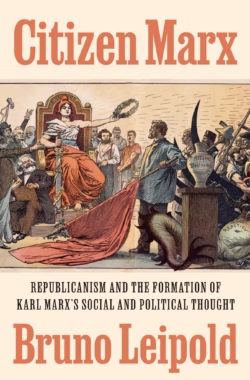Bruno Leipold’s Citizen Marx presents a compelling, deeply researched, and elegantly written analysis of Marx’s relationship to republicanism, and it will no doubt become an important point of reference in future discussions about Marx’s thought.1I would like to thank Zachary Levenson and Izzy Plowright from Spectre, as well as Dominique Routhier, Jacob Blumenfeld, Marie Thøgersen, and Nicolai von Eggers, for their help with this review. Based on fresh, close readings of Marx—including canonical texts such as The Communist Manifesto and Capital, as well as lesser-known articles and notebooks—and discussions of an impressive body of scholarship, Leipold reconstructs the intellectual trajectory that led Marx to articulate a powerful republican communism as the alternative to the despotic power of capital.
In the mid-nineteenth century, to be a “republican” meant fighting for a free and democratic political system based on universal (male) suffrage, in opposition to defenders of absolute monarchy and liberalist defenders of constitutional monarchy. The central political value of republicanism is freedom, understood in a purely negative sense as nondomination, or, the absence of arbitrary power—that is, not just the absence of actual interference, but of the very possibility of interference. Leipold’s core claim is that Marx’s critique of capitalism, as well as his thoughts on revolutionary strategy and the communist future, developed through a sustained dialogue with republican currents.
Most other socialists in the 1840s were deeply “anti-political” in the sense that they “had an ambivalent, even hostile, relationship to politics, democracy, and revolution,” as Leipold puts it.2Bruno Leipold, Citizen Marx: Republicanism and the Formation of Marx’s Social and Political Thought (Princeton: Princeton University Press, 2024), 191, https://doi.org/10.1515/9780691261867. Drawing on the republican ideas he had defended in his precommunist phase as a journalist and critic of the Prussian state (1842–43), Marx (and Engels) rejected the technocratic and authoritarian tendencies of British Owenists, German ‘True Socialists’ and French Saint-Simonians. Instead, he developed an analysis of the bourgeois republic as “an insufficient but necessary step for the emancipation of the proletariat.”3Leipold, Citizen Marx, 190. For Marx, the struggle for emancipation must pass through the capitalist state, rather than just circumventing it.
At the same time, Marx drew on the socialist critique of private property to criticize anticommunist republicans who failed to extend the critique of arbitrary power to the economic sphere. In this way, Marx and Engels occupied a unique and powerful position in the radical political landscape of the mid-nineteenth century: a republican communism grounded in an unshakable belief in the proletariat’s capacity for self-emancipation, against both antipolitical communists and anticommunist republicans (and, needless to say, defenders of monarchy).
The bulk of Citizen Marx—five out of seven chapters—deals with Marx’s writings from 1842 to 1852. In Chapter Six, Leipold shows how central the republican critique of arbitrary power is to the analysis of capitalism in volume one of Capital. The final chapter makes the crucial argument that some of Marx’s earliest republican ideas reemerge in his analysis of the Paris Commune in The Civil War in France (1871), which led him to reconsider the role of the state in revolutionary struggle and in any communist future. The Paris Commune taught Marx that “the working class cannot simply lay hold of the ready-made State machinery, and wield it for its own purposes,” as he famously put it in a passage from The Civil War in France that he and Engels quoted in their 1872 preface to The Communist Manifesto.
Citizen Marx is an excellent reconstruction of the debates in which Marx’s communism was forged, and it succeeds in contextualizing Marx’s thinking without burying it in the nineteenth century. Although the book is clearly a work of intellectual history, it also engages with several issues that remain relevant for twenty-first century revolutionaries. This includes an important demonstration of Marx’s analysis of the Paris Commune, in which he maintained that there would still be a need for some sort of political institutions in any communist future (contrary to the widespread idea that Marx believed in “the end of politics”).
I do, however, have a few critical remarks. They concern aspects of Marx’s thought that are missing from Leipold’s account and can be divided into two groups: the first concerns Leipold’s omission of Marx’s theory of value, and the second concerns a number of relevant writings that are not considered in Citizen Marx. None of these critiques implies disagreement with the book’s core claims; rather, they should be seen as suggestions for further strengthening Leipold’s examination of Marx.
The Theory of Value
My first critical remark concerns Marx’s theory of value, which Leipold leaves out entirely. Strikingly, the closest Leipold comes to addressing the theory of value is a footnote that repeats G. A. Cohen’s claim that the concept of exploitation does not necessarily depend on the labor theory of value.4Leipold, Citizen Marx, 326 fn. In my view, this is a remarkable omission. Not only is the theory of value one of the most fundamental elements of Marx’s critique of capitalism; it is also directly related to one of the central concerns of Citizen Marx, namely Marx’s critique of the arbitrary power of capital.
Leipold does not explain this absence, but it is tempting to interpret the silence as not unrelated to Leipold’s affinity with analytical Marxism, and with analytical philosophy more broadly. By this, I do not mean to suggest that Leipold endorses the many specific dead ends of analytical Marxism, such as G. A. Cohen’s technological determinism, John Roemer’s market socialism, or Jon Elster’s methodological individualism and “rational choice Marxism.” Rather, my point is that Leipold’s style of thought reflects the analytical tradition and its emphasis on a mode of reasoning and writing that understands itself as rigorous, clear, and scientific, in contrast to the supposedly obscure, convoluted style of continental thinkers such as Hegel, Heidegger, Adorno, or Derrida. A scholar with more continental inclinations might have found it relevant, for instance, to engage with Stathis Kouvelakis’s study of the young Marx’s political thought in Philosophy and Revolution (2003), or Moishe Postone’s study of Marx’s understanding of impersonal domination in Time, Labor and Social Domination (1993). Analytical Marxists have always been skeptical of Marx’s dialectical critique of the value form and the deeply speculative-Hegelian presentation of this theory in manuscripts such as the Grundrisse (1857–58), the so-called Urtext (1858) and the first edition of Capital (1867).
Leipold emphasizes how Marx “expanded and transformed those republican ideas from a focus on the arbitrary power of an individual to an analysis of how arbitrary power was exercised through and was constituted by a structure of property ownership and impersonal market forces.”5Leipold, Citizen Marx, 303. Leipold discusses the latter (the domination of everyone by the market) in terms of competition among capitals as well as among workers, rather than on the more abstract and fundamental level of the theory of value, where Marx analyzes market transactions in terms of relationships between private and independent producers”—that is. before the dialectical unfolding of concepts reveals these market agents to be capitalists and workers.


